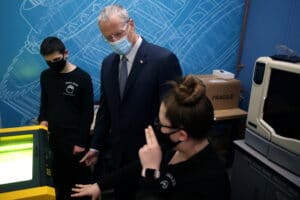
Gov. Charlie Baker toured the Essex North Shore Agricultural and Technical School on Thursday, April 29, 2021. Photo by Jonathan Wiggs | Boston Globe Staff / Pool
Gov. Charlie Baker wants to more than quadruple annual funding for an initiative to train 20,000 new workers in high-demand trades, but House Democratic leaders this week showed little appetite for the expansion.
The state, like many others, faces a shortage of construction tradespeople and skilled workers in many fields which is helping to significantly drive up construction costs. It is predicted that this deficit will increase as Baby Boomers in the workforce retire.
Baker proposed directing $16.9 million to the Career Technical Initiative program in his fiscal year 2022 budget, a boost that he and his deputies said would accelerate economic recovery and help close unemployment gaps exacerbated by the pandemic. But the House did not incorporate that funding in the budget it passed early Thursday morning.
During a Thursday tour of Essex North Shore Agricultural and Technical School, Baker, Lt. Gov. Karyn Polito and cabinet secretaries said greater investment in vocational and technical education opportunities is even more necessary now than when they launched the CTI program in January 2020 because of COVID-19’s impact.
“For us here in Massachusetts, we have a lot of people who thought they had a good job in a space where there was employment opportunity and possibility for advancement, and the pandemic certainly took a lot of that away,” Baker said. “I worry that if we don’t create this pivot and create this capacity and give people places and opportunities to gain these skills so that they can participate fully, and the industry they were in doesn’t come back the way it was before, we have the potential to leave a lot of people behind.”
The program aims to train 20,000 new workers over four years using three different shifts during the day at vocational schools: traditional daytime classes for students, afternoon programming for students who are enrolled in traditional high schools, and evening options for adults who are retraining or seeking a career change.
Baker and lawmakers agreed to $4 million in funding for the program in the fiscal year 2021 budget, and on Thursday, the administration awarded $2.1 million in CTI grants to support training programs at 10 vocational technical high schools.
The governor, however, proposed a significant expansion for the vocational training program in his FY22 budget (H 1), bumping CTI funding up to more than $15.3 million through the Executive Office of Labor and Workforce Development and recommending another $1.5 million through the Department of Elementary and Secondary Education.
That push did not find a receptive audience in the House. The Democrat-controlled Ways and Means Committee proposed $4 million for career technical institutes in its budget draft (H 4000), less than one-quarter of what Baker recommended.
Data presented to state education officials in February showed that, among students who applied to vocational schools for ninth grade, 60.4 percent of students of color received offers of admission compared to 73.2 percent of white students.
About 75 percent of student applicants who were not economically disadvantaged and 58.5 percent of economically disadvantaged students received admissions offers, the data show.
This month, Education Commissioner Jeff Riley suggested changes to admissions regulations for vocational-technical schools. His proposal would give schools flexibility to set their own policies “that promote equitable access” while restricting the use of criteria that disproportionately exclude students in protected classes.
The Board of Elementary and Secondary Education will likely vote in June on the final package.
Education Secretary James Peyser said Thursday that the so-called “second shift” of the CTI program, when students in traditional high schools participate in vocational-technical training in the afternoon, could increase high school voc-tech enrollment by 25 percent in the next three to four years.
The initiative and similar vocational investments the administration targeted in community colleges, training organizations and others represent “the most significant expansion of career technical education in over a generation,” Peyser said.
Baker said students and adults who participate will be better positioned to “meet the changing needs of our economy,” particularly as workers in trades retire over the coming years. He recounted seeing students at Essex North Shore Agricultural and Technical School already wearing laborers’ gear during his Thursday tour.
“I said, ‘Are these guys already members of Local 22?’ and the answer was no, but they will be, and that will be a great thing for you and a great thing for us here in Massachusetts,” Baker said.






